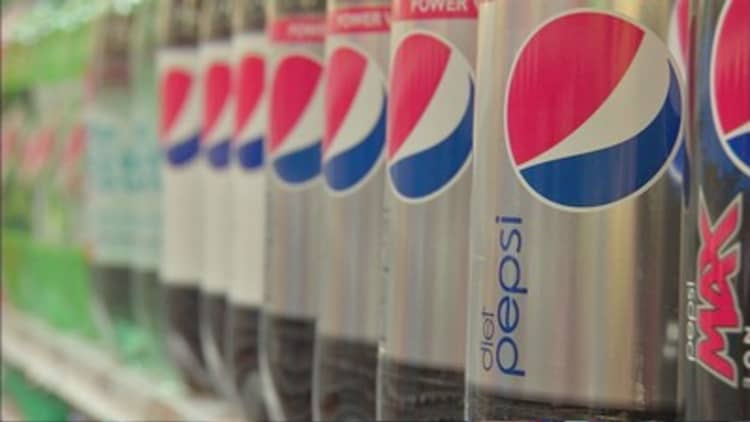
Emerging nations in Asia are trying to pop the fizz, with a tax on sugary drinks on the agenda of several fast-growing markets.
Among countries studying the implementation of a soda sin tax are India, Indonesia and Philippines, all of who have registered strong double digit growth in the market size for soft drinks over the last five years, according to statistics from consumer research firm, Euromonitor.
The move is sending chills across the beverage industry as Big Soda battles sin taxes and image issues amid rising public health concerns over the consumption of sugary drinks.
"Unprecedented price shocks in these volume growth markets could undermine the opportunity and strategic plans for global drinks players interested in expansion," said Howard Telford, Senior Beverages Analyst at Euromonitor in a report this month.
The market size for soft drinks in terms of retail value more than doubled in India from 2010 to 2015 while it rose 45 percent and 30 percent in Indonesia and the Philippines, respectively.
The world soft drinks market is forecast to reach $580 billion this year with top consumer U.S. accounting for about 17 percent of consumption in value terms.
According to Euromonitor, India is the world's sixth-largest market for soft drinks, with consumers expected to guzzle down an estimated 24 billion liters of these beverages this year.
Indonesia, meanwhile, comes in at the eight position, downing 23 billion liters.
U.S. imposed the first soda tax this year in the city of Berkeley, California when a one-cent per ounce tax was slapped on sugar-sweetened drinks.
Statistics from the World Health Organization showed worldwide obesity doubling since 1980 to 600 million adults in 2014.
In March, the WHO released guidelines for sugar intake recommending both adults and children to reduce daily intake of free sugars to less than 10 percent of total energy intake, saying it has solid evidence that reducing the consumption of free sugars to the recommended level reduces the risk of being overweight, obesity and tooth decay.
Free sugars refer to sugar added into food, including that from honey, syrups, fruit juices and fruit juice concentrates.
According to the U.S. National Institutes of Health, being overweight and obese increases the risk of coronary heart disease, high blood pressure, stroke and type 2 diabetes, among other heath related conditions.
It is primarily to address these health concerns that India, one of the world's largest sugar consumers with a penchant for sweets is mulling a tax on soda alongside Indonesia and Philippines.
Local reports from India suggest that the tax that has been mooted by a panel examining a new Goods and Services Tax bill could be as high as 40 percent on sweetened carbonated drinks, a level in line with taxes levied on tobacco and alcoholic drinks.
"Taxing these products is the right way forward, and restrictions should also be placed on celebrity endorsements of these unhealthy products, including Bollywood," said coordinator of the India Resource Center, Amit Srivastava, alluding to India's Hindi language movie industry.
"Protecting the public health of Indians, and particularly its children, is much more important than assuring profits for companies that sell sugary beverages," he added.
The non-governmental organization counters corporate globalization in India.
In fast-growing Indonesia, a soda tax has also been proposed, a move that could be a "body blow" for drinks manufacturers in the short-term amid slowing demand due to a slump in currency value and stiff competition from local beverage makers, said Euromonitor's Telford.
Likewise, the Philippines is in the process of clearing a bill on a sugary drinks tax that will see levy rising 4 percent every year.
In Malaysia, a consumer subsidy for sugar was withdrawn in 2013.
The soda and beverage industry is, as expected, resisting taxes on sugary drinks which they say will hurt consumption and business.
The American Beverage Association wrote in its latest blog post on Monday that a soda tax "sends the wrong message to consumers".
"Obesity is complex andisn't caused by one unique factor. Telling people that eliminatingone product from their diet is a silver bullet solution to certainhealth issues such as obesity is misleading."
The American trade association's statement came as the city of Davis in California considers a soda tax.
"Local businesses that are vital to communities such as Davis are the ones that see the impact of a tax the most. Ultimately, a soda tax will hurt the economy in Davis and could end up costing the city jobs," added the association whose members include The Coca-Cola Company, PepsiCo Americas Beverages and the Dr Pepper Snapple Group.
Indeed, the Indian subsidiary of Coca-Cola Co., which operates 57 factories and bottling plants across India said the proposal would hurt demand for drinks, leading to "no option but to consider shutting down certain factories" reported Reuters.
Vietnam, which was considering a consumption tax of 10 percent on soft drinks, caved into commercial pressure, scraping the plan last year.
In 2013, Denmark scrapped a decades-old soft drinks tax in a move to create jobs and boost the economy.


